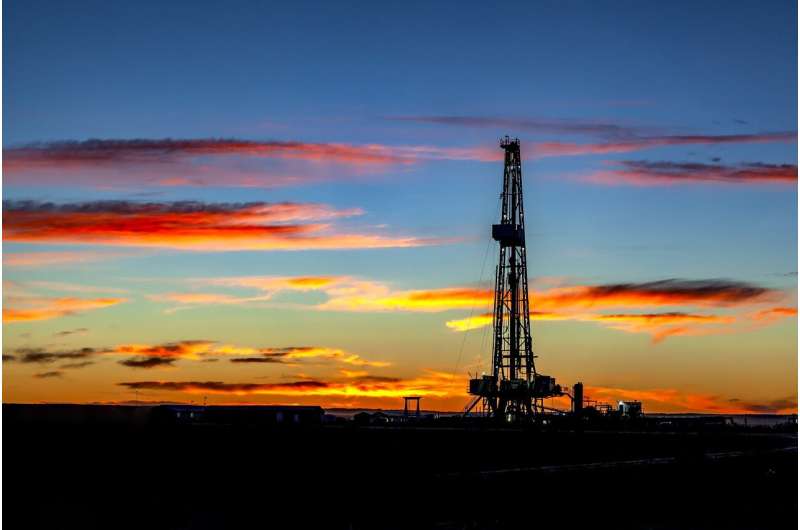
Source: Pixabay/CC0 Public Domain
As the oil and gas industry continues its rapid expansion in North America, there is a growing body of research linked fossil fuel development to physical and mental health conditions during and after pregnancy, including premature birth, congenital abnormalitiesAnd psychological stress.
But it appears that oil and gas production can be dangerous for this population group even before they become pregnant.
A new study led by researchers at Boston University School of Public Health (BUSPH) finds that people trying to conceive who live near oil and gas extraction sites are at greater risk for negative mental health outcomes.
Published in the American Journal of Public Health, the study used data from participants in the BUSPH-based Pregnancy Study Online (PRESTO) and found that people who lived within about six miles of active oil and gas development had greater development of moderate to severe depressive symptoms, compared to people who lived 12 to 31 miles from this activity. High perceived stress was elevated among people who lived only 1.25 miles from oil and gas development, and greater intensity of oil and gas production also contributed to high perceived stress.
Pre- and postpartum health issues have captured national attention amid rising rates of maternal morbidity and mortality in the U.S., but these new findings highlight people’s vulnerabilities during the preconception period, an otherwise understudied phase of the pregnancy process. The study is the first to assess the impact of fossil fuel development on pregnancy planners.
“Oil and gas extraction is a multifaceted exposure: it rapidly changes the economy, social structures, and environment of the community,” said study leader and corresponding author Dr. Mary Willis, an assistant professor of epidemiology at BUSPH, who recently launched a database with an SPH team to show which communities are most affected by fossil fuel sites. “All of the changes can cause stress and depression for local residents, an experience that may be particularly heightened for people trying to conceive. Identifying and mitigating potential mental health hazards, such as oil and gas extraction, is essential to facilitating healthy pregnancies.”
For the study, Dr. Willis and colleagues analyzed mental health survey data and information from a national database of oil and gas development well locations in the U.S. and Canada to identify potential associations between proximity to and density of active oil or gas development and psychological well-being among 5,725 PRESTO participants living in geographically diverse areas of the U.S. and Canada. The team limited the analysis to participants with household incomes below $50,000 to account for individuals who may not have the financial means to transition away from oil and gas operations if they wanted to.
To gauge participants’ mental health status, the team asked clinical questions about recent stressful events and depressive symptoms, as well as questions about medication use for mental health conditions. Using standardized metrics, rather than relying on medical records for mental health as most studies do, likely captured instances of depressive symptoms that could have been overlooked in the absence of documented clinical care.
According to study co-author Erin Campbell, a research associate in the BUSPH Department of Epidemiology, the economic fluctuations that come with oil and gas development can lead to increased stress among local residents.
“Periods of economic boom can overwhelm local infrastructure and social systems, while periods of economic downturn can leave communities facing job losses and economic hardship,” Campbell said.
The study also found that many participants who reported higher levels of stress and depressive symptoms lived farther away from oil and gas production than the minimum distance many states now require to protect people in homes, schools, and health care facilities. While poor mental health was associated with PRESTO participants within about six miles of oil and gas operations for depressive symptoms, states like Texas and Pennsylvania, where there is extensive oil and gas production, limit these “relapse” minimum distances to as little as 200 feet.
The researchers hope that this new insight will provide greater insight into the less visible health impacts of resource extraction in local communities and contribute to regulations for health-protective distances in residential areas.
More information:
Mary D. Willis et al, Residential proximity to oil and gas development and mental health in a North American preconception cohort study, American Journal of Public Health (2024). DOI number: 10.2105/AJPH.2024.307730
Quote: Living near oil and gas operations linked to poor mental health during preconception period (2024, July 11) Retrieved July 11, 2024 from https://medicalxpress.com/news/2024-07-oil-gas-linked-poor-mental.html
This document is subject to copyright. Except for fair dealing for private study or research, no part may be reproduced without written permission. The contents are supplied for information purposes only.
 Healthy Famz Healthy Family News essential tips for a healthy family. Explore practical advice to keep your family happy and healthy.
Healthy Famz Healthy Family News essential tips for a healthy family. Explore practical advice to keep your family happy and healthy.


